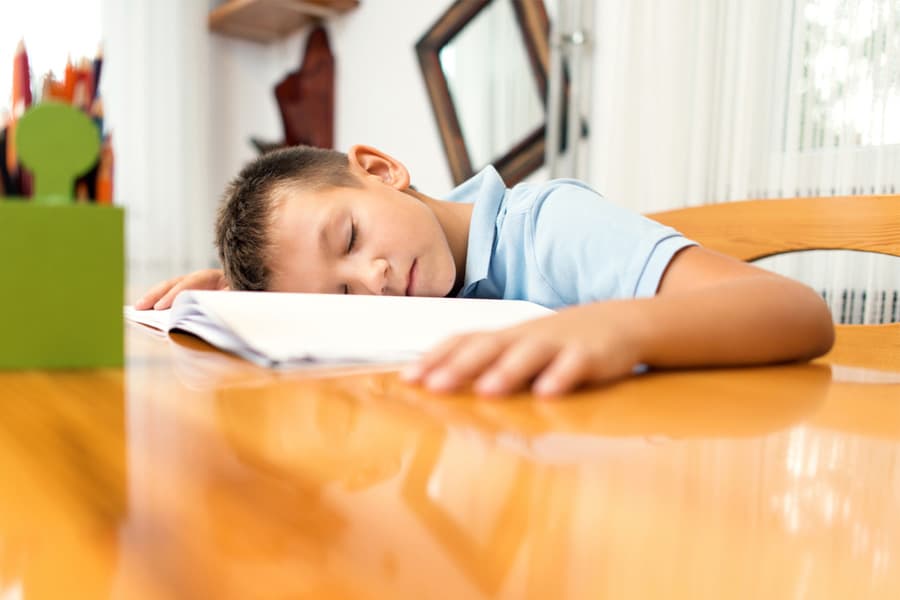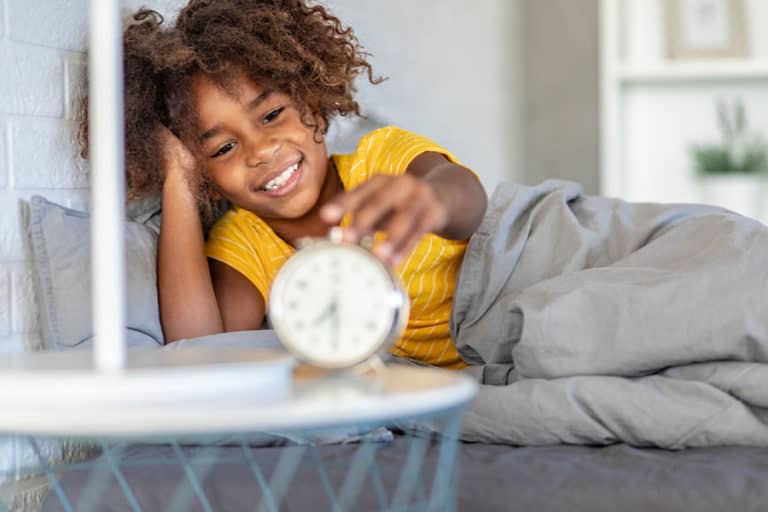What Time Should 11-Year-Olds Go To Bed?

Ideal Sleep Time | Number of hours | Tips to sleep on time | Sleep disorders | Harms of sleeping late | FAQ
Bedtime matters most to school-age children. It is the time when their body and mind can relax after a long day of learning and play.
A good night’s sleep is essential for children’s healthy growth and development. Additionally, adequate sleep will help them feel rested and ready for school the next day.
What Time Should 11 Year Olds Go To Bed?
11-year-olds should go to bed between 8.15 pm and 9.45 pm. Sleeping during this time window will help them get the recommended hours of sleep.
Although many factors influence bedtime, the earlier they go to bed, the better it is for their overall health and growth.
For example, if a child sleeps after 10 pm, they might wake up late, around 8 am, just in time for school. As a result, they would not have enough time to eat breakfast or prepare for the day. This would lead to them being grumpy and tired during school hours.
Number Of Hours An 11-Year-Old Should Sleep
Every age has its own sleep requirement. Some may need more sleep and some less, but average sleep time changes depending on age. So, how much sleep do 11 year olds need?
According to a study [1]PubMed: National Sleep Foundation’s sleep time duration recommendations: methodology and results summary on sleep time duration, toddlers from 0-2 years need roughly between 12 to 16 hours of sleep a day, which includes regular naps. However, the sleep requirement varies for school-age children. 3 to 5-year-olds need 10-13 hours of sleep, with only one nap per day. 6 to 11-year-olds should sleep from 9 to 11 hours per day.
11-year-old children are not recommended to sleep less than 7 hours and more than 12 hours in a day. Although sleeping outside the recommended range is normal, deviating far from the normal sleeping hours may lead to serious health conditions.
Here is a sample chart of the ideal sleeping and waking-up times for 11 years olds:
| Bedtime (11-year-old) | Wake-up time (11-year-old) |
| 8.15 pm | 6.00 am |
| 8.30 pm | 6.15 am |
| 8.45 pm | 6.30 am |
| 9.00 pm | 6.45 am |
| 9.15 pm | 7.00 am |
| 9.30 pm | 7.15 am |
| 9.45 pm | 7.30 am |
Tips To Help Your Child Sleep Quicker At Bedtime
From pre-teen stress to excessive screen time, a lot of factors can impact an 11-year-old’s sleep. Here are some tips to help your children fall asleep on time.
1. Set a night-time routine
One way to ensure your child goes to bed on time is by setting a night-time routine. A fixed routine will signal their body that it is time to wind down and sleep. This could involve anything from taking a warm bath, reading a book or listening to a bedtime story.
2. Stick to a regular sleep schedule
It is important to stick to a regular sleep schedule as much as possible. This means going to bed and waking up at the same time every day, even on weekends. This will help to regulate their body’s internal clock and make it easier to fall asleep at night.
3. Create a good sleeping environment
To help your child sleep better, create a calm and comfortable environment in their bedroom. This means keeping the room dark, quiet, and at a comfortable temperature. Setting up a sleeping environment will help them fall asleep faster.
4. Turn off all screens
Screens emit blue light that can disrupt melatonin production, [2]National Library of Medicine: Youth screen media habits and sleep: sleep-friendly screen-behavior recommendations for clinicians, educators, and parents the hormone that helps regulate sleep. So, avoiding screens about an hour before bed is best for improving sleep quality.
5. Avoid caffeinated drinks
Caffeine is a stimulant that can keep your child awake. So, it is best to avoid giving them caffeinated drinks like coffee, tea, colas, or soda close to bedtime.
Sleep Obstructing Disorders
If your child has difficulty sleeping even after following all the tips, it may be due to an underlying sleep disorder. Some common sleep disorders in children include:
Insomnia
Insomnia is a common sleep disorder that can make it difficult for children to fall asleep and stay asleep. Kids with insomnia may wake up frequently during the night or wake up early in the morning and be unable to go back to sleep.
Insomnia in teens can lead to daytime fatigue, grumpiness, and difficulty concentrating at school.
Sleep apnea
Sleep apnea is a serious sleep disorder that occurs when a person’s breathing is interrupted during sleep. It can be caused by enlarged tonsils or adenoids in kids.
Sleep apnea can lead to poor quality of sleep, which can then cause tiredness, irritability, and difficulty concentrating.
Night terrors and nightmares
Night terrors and nightmares are two different types of frightening dreams that can occur during sleep. Night terrors typically happen during the first few hours of sleep and are more common in younger children.
Nightmares usually happen later at night and are more common in older children and teenagers. Both night terrors and nightmares can cause sleep disruptions and can be upsetting for both the child and the parents.
Sleeptalking and sleepwalking
Sleeptalking (also known as somniloquy) is a parasomnia disorder that causes people to talk during their sleep. Sleepwalking (also known as somnambulism[3]SLEEP FOUNDATION: Sleepwalking: What is Somnambulism?) is another parasomnia disorder that causes people to walk or perform other activities while they are asleep. These disorders cause children/adults to wake up in the middle of sleep, leading to a lack of sleep and poor sleep quality.
Other causes
Some children may have trouble falling asleep because they have a fear of darkness, separation anxiety, or are going through a stressful event. If you notice any signs of sleep disorders, consult your personal pediatrician or a somnologist (sleep medicine specialist).
Harms Of Sleeping Too Late For 11-Year-Olds
What time a school-going child sleep makes a lot of difference in their health and school performance. This is especially true for 11-year-olds since this is when the child enters the pre-teen phase. Healthy habits practiced at this age can have long-term positive impacts on physical and mental health. Here are some harms of sleeping too late for 11-year-olds.
1. Less overall sleep
School children inevitably have to wake up at a fixed time on school days. Consequently, delaying their sleeping time eats into the amount of overall sleep they get per day. Additionally, as school-going children, they may be unable to find time for their afternoon nap. As such, they cannot compensate for the lost hours of sleep.
2. Irritability and mood swings
According to the kid’s health organization, [4]Kids Health: Kids and Sleep irregular sleep habits may lead to behavior issues such as irritability and mood swings. This means that they may have difficulty controlling their emotions.
3. Poor concentration and focus in school
There is an evident link between sleep deprivation and poor academic performance in school. This is because lack of sleep can lead to difficulty concentrating and retaining information [5]Sleep Foundation: Improve Your Child’s School Performance With a Good Night’s Sleep.
4. Tiredness and fatigue during the day
When an 11-year-old school-going child sleep too late, they fail to get enough sleep resulting in sleep deprivation. When an individual is sleep-deprived, they may feel tired and fatigued during the day. This can make it hard for them to stay awake and pay attention in class.
5. Health problems in the long run
If a child doesn’t get enough sleep, it can lead to health problems in the long run. This is because sleep deprivation weakens their immune system, deteriorates their well-being, and increases the risk of weight gain and cardiovascular diseases.
Conclusion
Although the amount of sleep each child needs varies, it is necessary to establish a bedtime routine for their cognitive development and overall health.
Good sleep hygiene habits, such as avoiding screens before bed and sticking to a regular sleep schedule, can help your child get the rest they need. If you struggle to get your child to adhere to a sleep schedule, consult your pediatrician.
FAQs
What time do 11-12 year olds go to bed?
An 11-12-year-old should ideally sleep between 8.15 pm and 10.00 pm. Staying awake beyond ten is detrimental to their health as it can lead to sleep deprivation.
How much sleep do 11 year olds need?
An 11-year-old should sleep for 9 to 11 hours a day. This is because their bodies are growing and developing, and they need the rest to function correctly.
Is going to bed at 8 pm too early?
No, going to bed at 8 pm is not too early. In fact, an early bedtime is ideal for an 11-year-old. This is because they need 9 to 11 hours of sleep a day, and going to bed at 8 pm would allow them to get the total amount of sleep they need.
Is going to bed at 11 pm early?
No, going to bed at 11 pm is not early. In fact, sleeping at 11 pm is considered an unhealthy sleeping pattern in children. This will lead to insufficient sleep and can cause health problems in the long run.
References
| ↑1 | PubMed: National Sleep Foundation’s sleep time duration recommendations: methodology and results summary |
|---|---|
| ↑2 | National Library of Medicine: Youth screen media habits and sleep: sleep-friendly screen-behavior recommendations for clinicians, educators, and parents |
| ↑3 | SLEEP FOUNDATION: Sleepwalking: What is Somnambulism? |
| ↑4 | Kids Health: Kids and Sleep |
| ↑5 | Sleep Foundation: Improve Your Child’s School Performance With a Good Night’s Sleep |





